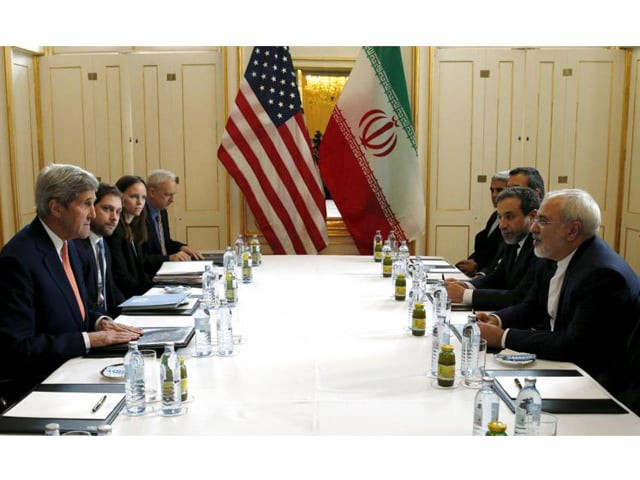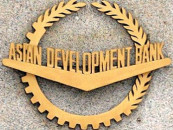Iran says international sanctions to be lifted on Saturday
Today is a good day for the Iranian people as sanctions will be lifted today, says Iranian foreign minister

US Secretary of State John Kerry (L) meets with Iranian Foreign Minister Mohammad Javad Zarif on what is expected to be "implementation day," the day the International Atomic Energy Agency (IAEA) verifies that Iran has met all conditions under the nuclear deal, in Vienna January 16, 2016. PHOTO: REUTERS
"Implementation day" of the nuclear deal agreed last year marks the biggest re-entry of a former pariah state onto the global economic stage since the end of the Cold War, and a turning point in the hostility between Iran and the United States that has shaped the Middle East since 1979.
It is a defining initiative for both US President Barack Obama and Iran's President Hassan Rouhani, both of whom faced strong opposition from hardliners at home in countries that have called each other "Great Satan" and part of the "axis of evil".
A decade in the making: The deal is sealed
Iranian Foreign Minister Javad Zarif arrived in Vienna, headquarters of the International Atomic Energy Agency, the UN body expected to issue a report triggering the lifting of sanctions imposed by the United Nations, United States and European Union. US Secretary of State John Kerry arrived hours later, expected to head straight into a meeting with Zarif.
"Today with the release of the IAEA chief's report the nuclear deal will be implemented, after which a joint statement will be made to announce the beginning of the deal," Zarif was quoted as saying in Vienna by state news agency IRNA.
"Today is a good day for the Iranian people as sanctions will be lifted today," the ISNA agency quoted him as saying.
The sanctions have cut off a nation of nearly 80 million from the global financial system, drastically reduced the exports of a major oil producer and imposed severe economic hardship on ordinary Iranians. Most will be lifted immediately.
Kerry arrives in Vienna as world powers prepare to lift sanctions against Iran
Even before the expected announcement, Iran's Mehr news agency reported on Saturday that executives from two of the world's largest oil companies, Shell and Total, had arrived in Tehran for talks with the state oil and tanker companies.
Under the deal, Iran has agreed to forego enrichment of uranium, which world powers feared could be used to make a nuclear weapon. Once sanctions are lifted, Iran plans to swiftly ramp up its exports of oil. Global companies that have been barred from doing business there will be able to exploit a hungry market for anything from automobiles to airplane parts.
Iran's expected return to an already glutted market is one of the main factors contributing to a global rout in oil prices, which fell below $30 a barrel this week for the first time in 12 years. Tehran says it could boost exports by 500,000 barrels per day within weeks and 500,000 more within a year, in a world already producing 1.5 million barrels a day more than it consumes and running out of storage space to hold it.
Republicans, Israelis, Saudis suspicious
The deal is opposed by all of the Republican candidates in the field vying to succeed Obama as president in an election in November, and is viewed with deep suspicion by US allies in the Middle East including Israel and Saudi Arabia.
It is supported by Washington's European allies, who joined Obama earlier in his presidency in making sanctions far tighter as part of a joint strategy to force Tehran to negotiate.
The Obama administration says the deal reached last July offered the best possible prospect of ensuring that Iran would not develop a nuclear weapon, and could never have been achieved without the support of allies, which was always contingent on a pledge to lift sanctions once Iran complied.
For Iran, it marks a crowning achievement for Rouhani, a pragmatic cleric elected in 2013 in a landslide on a promise to reduce Iran's international isolation. He was granted the authority to negotiate the deal by Supreme Leader Ayatollah Ali Khamenei, an arch-conservative in power since 1989.
The US-educated, fluent English-speaking Zarif has emerged as the cheerful face of Iran's diplomacy, developing a close rapport with Kerry in unprecedented one-on-one talks. Zarif has chipped away at Iran's image as a pariah state, to the dismay of hardliners in Tehran as well as regional rivals.
"There are some people who see peace as a threat, who were always against (the nuclear deal) and will continue to oppose it," he was quoted as saying by ISNA.



















COMMENTS
Comments are moderated and generally will be posted if they are on-topic and not abusive.
For more information, please see our Comments FAQ